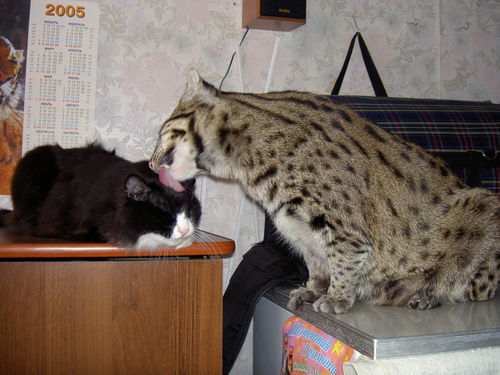What the hell? Did they let Keanu come up with the name of this one? And whose bright idea was it to make the entire movie look like a Charles Schwab commercial?
This I don't understand.
|
Life, law, and frosted donuts.
|

|
What the hell? Did they let Keanu come up with the name of this one? And whose bright idea was it to make the entire movie look like a Charles Schwab commercial?
This I don't understand.
(Doo dah, doo dah...)

GG inspired me to mess around with Yahoo!'s avatar generator. I even used the same background as she did, since we're both lawyers. So what do you think? Should I use this in place of "ROAST BEEF SANDWICHED!!!" over there?
UPDATE: Meli now has her own avatar as well. Check it out!
Check out SCOTUSblog for slip opinions and analysis. This is, indeed, huge.
I'm hoping to find time to read the opinions this weekend and provide my own uninformed hare-brained analysis, but for now here's a quick observation. Based on the syllabus it seems like the Court could have stopped at the statutory interpretation holding -- that the military tribunals aren't authorized by Congress under current law, and are therefore illegal. The fact that they went on to consider the Geneva Convention issue at all, let alone determine that its provisions are judicially enforceable and applicable to the Al Qaeda conflict (reversing the D.C. Circuit on both points), is very surprising.
The fifth Harry Potter book is my favorite, chiefly on account of its representation of the Wizard system of government. Harry's endless struggles with the Ministry of Magic -- some humorously bureaucratic, some downright nasty -- and the attitude he developes toward the Ministry give the book a very rebellious and anarchistic tone. I think it's an important aspect of the broader story and it's clear that J. K. Rowling isn't a big fan of government.
However, I don't think this observation merits an entire law review article published by one of the nation's top law schools. And the fact that the author is a real-life law professor who looks like he's on his way to a sorority formal just embitters me even more.
And while we're on the subject, I will happily read the seventh Harry Potter book, knowing full well that it may be as lousy as the sixth, but under no circumstances will I allow Harry Potter and the Law into my home or office.
With all the hullaballoo about the New York Times and other papers reporting Bush II's latest questionable tactics in the War on Terr', complete with harsh, vaguely threatening words from the gubment, I decided to give the The Pentagon Papers Case another perusal. The case dealt with the publication of top secret(!) government documents detailing the United States' involvement in the Vietnam War. The Supreme Court, via a 6-3 per curiam decision, lifted the injunctions that the government had obtained in the lower courts and allowed the documents to be published. The case is unique in that each of the nine justices wrote separate opinions.
The concurring opinion of Justice Black (pictured above) is a glorious love letter to the First Amendment, with bold proclamations like this:
"The Government's power to censor the press was abolished so that the press would remain forever free to censure the Government. The press was protected so that it could bare the secrets of government and inform the people. [...] In my view, far from deserving condemnation for their courageous reporting, the New York Times and the Washington Post, and other newspapers should be commended for serving the purpose that the Founding Fathers saw so clearly." (p. 717)
And prescient gems like this:
"The word 'security' is a broad, vague generality whose contours should not be invoked to abrogate the fundamental law embodied in the First Amendment. (p. 719)
For more on the Pentagon Papers Case, check out this page, brought to you courtesy of The George Washington University. Enjoy this stuff while it lasts -- something tells me that if the government tries to wield the Espionage Act against newspapers these days they'll fare slightly better before the current Court.
I added a few more links to Ye Olde Sidebarre. Say hello to:
Sunship Balloons, who joins us from Wisconsin, but will hopefully be returning to California soon (what's the status on that, by the way?)/
The Neutral Zone Trap, helmed by a woman whose name sounds really familiar but whom I don't think I've ever met, and whose most recent entry is tragically hilarious. Kind of like this gif:

Queen's Law Life, who will add some international flava by telling us how they do things in the Northland.
Two-Timing the Cosmos, who has been filed under "Law-Type Blogs" because our connection comes via the legendary Girl Walks Into a Bar (Exam) blog from last summer.
UPDATE: Did some minor screwing with the webcomic section -- deleted Spamusement, which seems to be dead, and added Cyanide and Happiness.
Interesting. I don't know how much taking the Federal Government does (perhaps someone could enlighten me on that), and this doesn't (and can't) affect takings by state governments, so I don't know how much of a real-world impact this will have. But it does go to show that some questionable Supreme Court decisions do have political solutions.
UPDATE: Here is a Volokh Conspiracy post with more probing analysis, concluding that the EO is a piece of crap. The post states that (1) as worded it doesn't actually prevent the type of taking that Kelo blessed and (2) even if it did, it wouldn't do much because most condemnations are state and local matters.
I mentioned earlier that the Supreme Court seems to be going a little nuts with Patent Law these days, taking on an unprecedented (hurr!) number of Patent cases. The latest development comes in the case of Laboratory Corp. of America Holdings v. Metabolite Laboratories, Inc. Here's what went down:
The Court granted cert in a somewhat peculiar area of Patent Law -- the idea that naturally-occurring phenomena are not patentable. The canonical illustrations of this principle are that Einstein couldn't have patented E=mc2, and Newton couldn't have patented gravity (though Glen Seaborg successfully patented the elements americurium and curium, which is pretty cool). Laboratory Corp. dealt with a correlation between a certain substance in the blood and certain types of vitamin deficiencies. The Court granted cert on the issue of whether the patent on testing for and observing the substance level and then determining the presence of a vitamin deficiency was patentable. After a great deal of briefing on the issue, including input from the Solicitor General, the Court dismissed the writ of certiorari as "improvidently granted." The vote was 5-3, with Roberts not participating. The Court essentially agreed to consider the issue and then gave us a big "Just kidding."
Stranger still, Justice Breyer wrote a 15-page dissent to the dismissal of cert that was joined by Justices Stevens and Souter. The structure of the dissent is basically, (1) We should answer the question and here's why, (2) Here's the answer, and (3) The answer makes answering the question even more important. Among the reasons that Breyer gives for why the Court should answer the question is simple politeness: "We said that we would do so."
Breyer's discussion of the merits of the case is an interesting read if you're into that kind of thing. But the whole episode just strikes me as very strange.
EDIT: This is probably the first time I've used variations on the word "freak" in two consecutive blog posts.

Am I wrong to want one of these?
I found [SEE BELOW BEFORE CLICKING!!!]this on Something Awful. According to the [THIS ONE TOO!!!]SA thread, which compiles a lot of photos, the basic story is that there's a Russian family who adopted some wild kittens/cubs, who grew up to be really big cats. I think they're neat.
In the Russian thread, on page three you will encounter a picture of a woman in a bathtub with the cat, and you can kind of see her parts through the murky water. In either thread, you will see a photographic record of the big cuddly cat killing, dismembering, and devouring a chicken. Click with caution.
I realize how strange it is to read reviews of advertisements regularly (thank you, Kenny, for introducing me to Ad Report Card and getting me hooked), but I really enjoy Seth Stevenson's column over at Slate. I don't watch much TV, so most of the ads he reviews are ads I've never seen, but his latest column on the detestable new Mac ads hits home in a special place. This is a series of ads that I am familiar with and which drive me absolutely crazy.
I won't provide much independent criticism of the ads, since I agree with almost everything that Stevenson says. Especially the thing about the digital camera. (I mean, really, who the hell has trouble using a digital camera with a PC? If somewhere there's a digital camera and a PC that aren't talking to each other I guarantee you it's the camera's fault, and that camera couldn't talk to a Mac either.) And I love his point about the nerdy guy being more likable than the hipster. In fact, I think what really bothers me about the ads isn't the smug, recycled, and increasingly inaccurate party line about Macs being easier to use than PCs, but the fact that John Hodgman, who I always enjoy on The Daily Show, has sullied himself by participating in them. Boo, John Hodgman.
Meli and I went to the symphony last night and saw/heard Verdi's Requiem Mass. It was fabulous. The lyrics were printed in the program in the original Latin together with their English translations, and at one point the chorus sings: "Pie Jesu domine, dona eis requiem" ("Merciful Lord Jesus, give them rest"). If that sounds familiar it's because it's what the face-smacking guys are chanting in Monty Python and the Holy Grail. When I alerted Meli to this fact during the performance (there was no intermission) she told me to hush up. Apparently she wasn't as excited about this discovery as I was.
A couple of quick thoughts on some Supreme Court crap. The big news is that the Court has held in Hudson v. Michigan that violation of the "knock and announce" rule does not require the suppression of evidence seized thereby. The knock and announce rule, such as it is, states that even if police have a warrant to enter a home, they have to knock and announce their presence before they enter. Apparently they still have to do that under the Constitution, but there are no evidentiary consequences if they don't. Since the exclusionary rule (the idea that evidence obtained in violation of the Fourth or Fifth Amendments cannot be used against the person whose rights were violated) is the only thing that gives any teeth to these kinds of standards, this effectively destroys the knock and announce rule. A lot of people who have more time to think about these things than I do are expounding on what this decision means in the broader sense - whether the exclusionary rule in general is in trouble, whether this signals a long-dreaded lurch to the right by the Court in the wake of two Bush II appointments, what this really means for our civil liberties and property rights, etc. - but for now I'd just like to point out that police will still probably knock before they exercise warrants. They'll just knock once, really hard, with a foot instead of a hand.
In a development that is far less sexy but more directly related to my own work, the Supreme Court has taken up yet another patent case: KSR International v. Teleflex. The Court seems to be doing a lot of patent crap recently, which is a little surprising given the fact that I can probably count the number of Supreme Court patent cases I read in law school on one hand. I think more Supreme Court involvement in patent law is a good thing, despite the fact that Federal Circuit judges tend to ignore Supreme Court decisions that they don't agree with. KSR itself deals with patent obviousness, which is something that could actually use a little work. My favorite patent case of all time is an obviousness case: In re Dembizcak, 175 F.3d 994 (Fed. Cir. 1999). I wouldn't be too upset if this case were gutted by the Supreme Court. I've come to the conclusion that I like the case not because of any affinity for the holding, but because it deals with those Halloween garbage bags that look like giant jack-o-lanterns.
If there's one thing I like about working late at home, it's watching Good Times on TV Land. And if there's one thing I like about watching Good Times on TV Land, it's the occasional bizarre "Hey, it's that guy!" moments that the show's numerous one-off guest stars create.
For example, on a recently aired episode, Jay Jay and three of his friends (together comprising the self-proclaimed "Awesome Foursome") buy a car together. One of the Awesome Foursome, inexplicably named "Head," looked familiar, so I looked him up on IMDB. Turns out that, after his semi-recurring role on Good Times as an offensive Black stereotype, he went on to play Mike, the easy-going teacher on Punky Brewster and a positive Black role model for the show's mostly White children.
Even more exciting, last night's episode centered on a lovable wino named "Fishbone" Johnson, who was played by none other than Robert Guillaume. Robert Guillaume, as well all know, went on to play Benson, the erudite and wise-cracking butler on Soap. Guillaume also played Benson on the Soap spin-off, Benson. Fewer people may know that Guillaume was the third person to play the Phantom in the original run of The Phantom of the Opera. Guillaume replaced Davis Gaines, who had replaced Michael Crawford.
NITROGLYCERIN STABILIZED IN CLAY!!!
I really like this photo:
I wonder what they teach at How to Blog
DSC07428.JPG
Thanks LawGeek.
g. Livejournal vs. Blogger? What to do when your comments break? Effective use of "[Best/Worst] [noun] EVER!!!"?
But I don't subscribe to The Green Bag, so I guess I can't get one unless I buy it on eBay. Apparently a Scalia Bobblehead sold on eBay for like $500. Probably not worth it, but a mini-Kennedy would be a welcome edition to my growing collection of Office Crap.